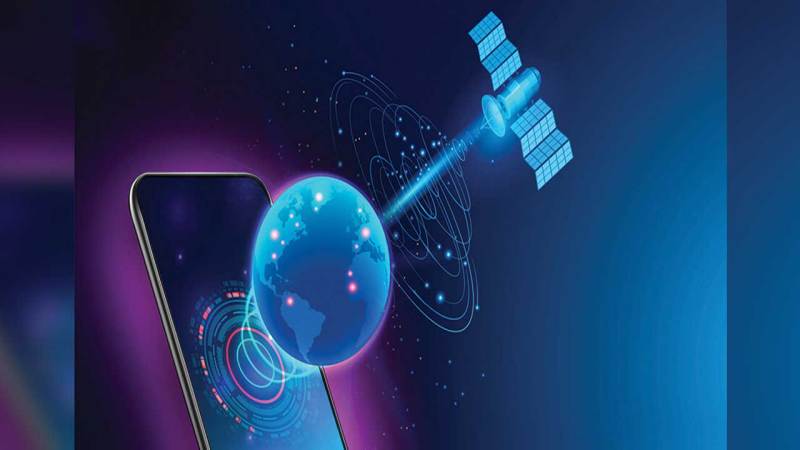
SpaceX, a company famous for playing an important role in space, is now going to conduct an experiment that will make mobile phone towers a thing of the past. SpaceX’s Starlink has launched a new satellite communications service. Which is called direct-to-sale.
Through this technology, mobile phone users will be able to connect their smartphones directly to Starlink. That means there will be no need for a mobile tower for mobile phone signal. The mobile phone will connect directly to the satellite. Even in areas where telecom companies have not been able to install cell towers, there will be no need for traditional mobile towers. Internet and call connectivity will be available through direct connection to the cellphone’s satellite. If this technology becomes successful then the future of mobile phone technology will definitely change. This will have a deep impact on the telecom industry and the need for mobile towers will gradually disappear.
Apart from expanding mobile coverage, the direct-to-sale service will also provide connectivity to millions of Internet of Things (IoT) devices. According to SpaceX’s claim, no special or additional hardware is required to connect mobile phones through this technology. Users will continue to get uninterrupted connectivity during natural disasters or other emergencies. This service will prove to be a boon especially while traveling in rural areas or dead zones. Apart from increasing mobile coverage, direct-to-sale technology can also prove to be very useful during emergencies. Usually, when there is a disaster like cyclone or earthquake, problems like falling of mobile tower, problem or malfunction in wiring come to the fore. But if the phones are connected to the satellite network, connectivity will remain operational even at the disaster site and emergency service assistance will be available without delay.
This new service from Starlink is certainly a unique achievement in satellite communications. This service, which provides direct connection from satellite to smartphone, will not require any kind of cell tower. Besides, communication services will be easily available even in those areas where there is no coverage. SpaceX is continuously deploying new satellites to increase connectivity around the world. By integrating satellite technology with existing mobile networks, the service provides text messaging, calling and data services without any special hardware or apps.
Along with launching the direct to sale service, world’s leading businessman Elon Musk’s company SpaceX has also announced partnerships with many big telecom companies. This has been confirmed by Elon Musk himself through a post. Starlink has been continuously expanding its satellite communications network for the past few months. The company is continuously launching new rockets as well as new satellites to increase the speed. According to a report, users are now enjoying internet speed of 250-350 Mbps. This speed is much higher than the 50-60 Mbps speeds available via fiber in areas of South Australia. SpecX is currently manufacturing advanced rockets and spacecraft. Elon Musk’s company Starlink is also launching spacecraft and rockets to deploy satellites. Direct-to-sale satellites are currently launched on SpaceX’s Falcon 9 rocket and Starship. It is noteworthy that, while well-known businessman Elon Musk’s company SpaceX is trying to bring another revolution, Musk’s telecom company is moving towards opening in India. Meanwhile, Mukesh Ambani’s Reliance Jio Infocomm Ltd and Sunil Mittal’s Bharti Airtel Ltd are set to give tough competition to the proposed US player. It is expected that this American telecom company will overtake these two major telecom companies of India. Currently, Jio and Airtel are the two largest players in mobile communications and high-speed internet data in India. Both these telecom companies are offering the latest features like 5G and OTT platforms at sustainable prices. But with the entry of American companies, competition in this sector may intensify.
A look at new communications service features
Internet and call connectivity will be available through direct connections to satellites from cellphones, eliminating the need for traditional mobile towers.
Apart from expanding mobile coverage, the direct-to-sale service will also provide connectivity to millions of Internet of Things (IoT) devices.
Connecting mobile phones through this technology does not require any special or additional hardware. By integrating satellite technology with existing mobile networks, the service provides text messaging, calling and data services without any special hardware or apps. Is.
Uninterrupted connectivity will continue to be available even in adverse conditions, especially while traveling in rural areas or dead zones. This service will be very useful, apart from increasing mobile coverage, direct-to-sale technology can also prove to be very useful. In emergencies, usually during cyclones or when there is a disaster like an earthquake, there are problems like mobile towers falling, wiring problems or malfunctions, but if the phones are connected to satellite networks, connectivity is maintained even at the disaster site. May go. Will remain operational and emergency service support will be available without any delay. Communication services will be easily accessible even in areas currently without coverage.
Mukesh Ambani’s Jio and Bharti Mittal’s Airtel will face a challenge.
Business tycoon Elon Musk’s company Starlink is rumored to be launched in India, while Starlink plans to connect directly to satellites instead of towers for mobile phone connectivity, if the company is successful then it will bring a boom to the Indian telecom sector, hence Mukesh Jio and Bharti Mittal’s Airtel will be serious challenges against Ambani, although it is also discussed that in order to remain competitive against Elon Musk’s company, these two major telecom companies of India have Have made their respective preparations, there is a possibility that the American telecom company will overtake these two major telecom companies of India, currently Jio and Airtel are the two largest in the field of mobile communication and high-speed internet data in India. Both these telecom companies are players and are offering the latest features like 5G and OTT platforms at sustainable prices, but the entry of the American company has increased competition in the sector. can be intense
 look news india
look news india